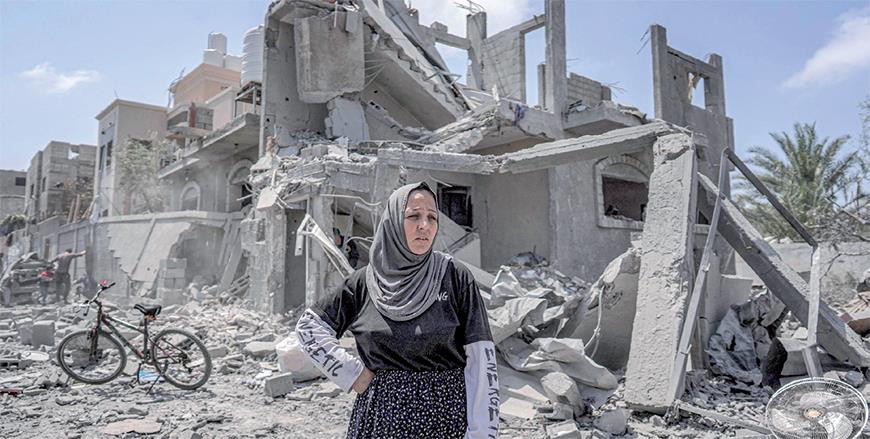
Israel Presses On In Gaza As World Awaits Reaction To Iran Attack
World powers have called for restraint after Iran launched more than 300 drones and missiles at Israel late Saturday, though the Israeli military has said nearly all were intercepted.
Tehran's first direct assault on Israel, in retaliation for a deadly April 1 strike on its Damascus embassy consular annex, followed months of violence across the region involving Iranian proxies and allies who say they act in support of Palestinians in the Gaza Strip.
No decision has been made on how, when - or if - Israel could respond to the Iran attack, local media said, reporting that Israeli prime minister Benjamin Netanyahu would meet with his war cabinet later Monday.
Tensions in Iran "weaken the regime and rather serve Israel," the newspaper Israel Hayom said, adding that this suggested Israeli leaders would not rush to retaliate.
Iranian President Ebrahim Raisi has warned that a "reckless" Israeli move would spark a "much stronger response".
Tehran has insisted the attack on Israel was an act of "self-defence" after the Damascus strike that killed seven Revolutionary Guards including two generals.
Attention has also turned to Israel's top ally, the United States, which played a key role in shooting down the Iranian drones.
Gaza war toll rises
The Israeli military said it would not be distracted from its war against Hamas in Gaza, triggered by the Palestinian armed group's October 7 attack on Israel.
“Even while under attack from Iran, we have not lost sight... of our critical mission in Gaza to rescue our hostages from the hands of Iran's proxy Hamas,” military spokesman Rear Admiral Daniel Hagari said late Sunday.
Israel estimates that 129 hostages, including 34 presumed dead, remain in the hands of Palestinian militants since the attack six months ago.
The Hamas government media office said Israeli aircraft and tanks launched“dozens” of strikes overnight on central Gaza, reporting several casualties.
Witnesses told AFP that strikes hit the Nuseirat refugee camp, with clashes also reported in other areas of central and northern Gaza.
Hamas's attack that triggered the war resulted in the deaths of 1,170 people, according to Israeli figures.
Israel's retaliatory offensive has killed at least 33,797 people in Gaza, mostly women and children, according to the health ministry in the Hamas-run territory. The toll rose by at least 68 deaths over 24 hours.
Israel released around 150 detainees on Monday who had been rounded up in Gaza, the territory's crossings authority told AFP.
Lebanon's Iran-backed Hizbollah group, which has had near-daily cross-border clashes with Israel since the war broke out, claimed an overnight attack on Israeli soldiers who had crossed into Lebanese territory.
The Israeli army confirmed that four of its troops were wounded in an explosion while inside Lebanon.
'On the brink' of war
The United Nations Security Council held an emergency meeting Sunday following the Iranian attack, where Secretary-General Antonio Guterres warned the region was“on the brink” of war.
“Now is the time to defuse and de-escalate,” Guterres said.
Britain and Germany were among those also calling for de-escalation on Monday, while French President Emmanuel Macron said his government would help do everything it could to avoid a“conflagration” in the Middle East.
A United States official said the hope was that“in the light of day” Israel would see it had won a“spectacular success” against Iran's attack, which resulted in no reported deaths.
However, Middle East analyst James Ryan said he feared the“status quo will be short-lived”.
“I expect Biden to attempt to restrain Israeli responses, but Netanyahu has already shown a willingness to test any kind of limit Biden wishes to impose,” he said.
Netanyahu, who leads a coalition including religious and ultra-nationalist parties, has faced regular protests by anti-government demonstrators as well as supporters of the Gaza hostages demanding the government get them home.
Experts, and the protesters, have said they expect Netanyahu to continue the war as a tactic to remain in power.
Ahead of Iran's attack, Israel closed schools and announced restrictions on public gatherings. But the army said on Monday that those measures were being lifted for most of the country.
In Iran, airports in the capital and elsewhere reopened on Monday, state media said.
World oil prices sank as traders bet on a de-escalation of tensions.
Mediation
More than six months of war have led to dire humanitarian conditions in the besieged Gaza Strip, which the UN has warned faces imminent famine.
Rumours of a reopened Israeli checkpoint on the coastal road from the territory's south to Gaza City sent thousands of Palestinians heading north on Sunday, despite Israel denying it was open.
Attempting the journey back to northern Gaza, displaced resident Basma Salman said,“even if it (my house) was destroyed, I want to go there. I couldn't stay in the south”.
“It's overcrowded. We couldn't even take a fresh breath of air there. It was completely terrible.”
In Khan Yunis, southern Gaza's main city, civil defence teams said they had retrieved at least 18 bodies from under the rubble of destroyed buildings.
Responding late Saturday to the latest truce plan presented by US, Qatari and Egyptian mediators, Hamas said it insists on“a permanent ceasefire” and the withdrawal of Israeli forces from Gaza.
Israel called this a“rejection” of the proposal, but the US said mediation efforts continue.

Legal Disclaimer:
MENAFN provides the
information “as is” without warranty of any kind. We do not accept
any responsibility or liability for the accuracy, content, images,
videos, licenses, completeness, legality, or reliability of the information
contained in this article. If you have any complaints or copyright
issues related to this article, kindly contact the provider above.























Comments
No comment